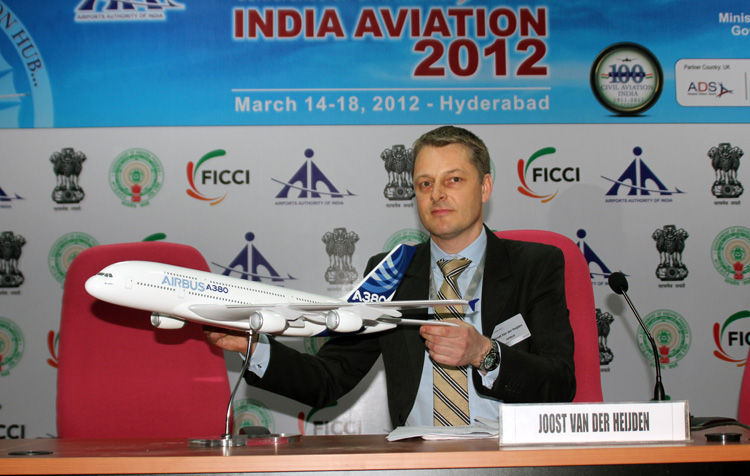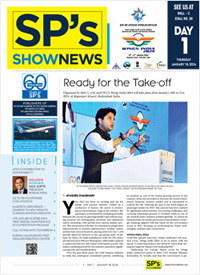- Prime Minister Narendra Modi inaugurates Aero India 2023 in Bengaluru; Releases Commemorative Stamp
- Defence Secretary meets delegations from Saudi Arabia, USA and Oman on the sidelines of Aero India 2023
- Foreign Ministers of 32 countries to attend Aero India 2023
- Embraer showcases the C-390 Millennium at Aero India 2023
Airbus hopes high from India

Airbus once again reiterated that India is a key market for the company and stated that the Airbus market share of new aircraft orders in India is over 70 per cent. Addressing a press conference on the second day of India Aviation, Airbus officials stated that keeping this in view, the company is strengthening its six pillars in the country. “We continue to see growth in India both in short-term and long-term. Since 2005, we have sold 500 aircraft in India and have over 70 per cent market share. We see that there will be additional requirements,” said, Joost Van Der Heijden, Head of Marketing, India, Airbus.
According to the company, India’s annual passenger traffic growth which is 7.2 per cent is well above the growth in Asia Pacific (5.9 per cent) and world average of 4.8 per cent. By 2030, India’s passenger fleet will be more than triple to about 1,180 aircraft. The new passenger aircraft will include 646 single aisles like the A320 and A320neo family, 308 twin aisles like the A350 XWB and A330, and 66 very large aircraft such as the A380. “Despite the challenges, India’s growth in domestic air travel will reach even higher growth rates of nearly 10 per cent annually, making it one the fastest growing aviation markets anywhere in the world.”
The officials spoke in detail about the company’s six pillars of cooperation in India-Airbus Engineering Centre India (AECI), pilot and maintenance training, aerostructure design and build, research and technology and other initiatives including spares centre, MRO, etc. Airbus relationship with India began with the sale of A300 35 years back and was followed by collaboration with HAL, which is still going strong. Over the years, Airbus has had partnerships with many private Indian companies as well. And today, half of all A320 forward doors and all flap track beams are manufactured in India. The company has a long-standing partnership with HAL to produce 50 per cent of forward passenger doors for all A320 family aircraft. Likewise, it has a partnership with Dynamatis for assembly of flap-track beams for the A320 family aircraft; and with Tata to produce composite parts for A350 XWB programme. Speaking about the engineering capabilities of India, Srinivasan Dwarkanath, Vice President, Industrial Cooperation, Asia-Pacific and Middle East, said that many complex components are being made in India. “Every A320 today is partly made in India.”
EADS is looking for a partner for establishing a maintenance, repair and overhaul (MRO) facility in the country for Airbus. “We have met 85 to 90 per cent of the offset clause and we are now working with different private companies in India trying to ensure that MRO in India will be materialised soon,” said Dwarkanath.
“India produces 3,000 to 4,000 engineers every year. The AECI in Bangalore has a become a regional hub and personnel from 23 airlines have already undergone training at the centre. The AECI has employed 270 local engineers working in high end analysis and design on all Airbus products. The centre is expected to grow to 450 in the next three years. The second pilot training centre has been setup in the National Capital Region in cooperation with CAE and Interglobe to complement the existing facility in Bangalore. Together, these centres will have the capacity to train up to 5,000 pilots and maintenance engineers every year.”
On being asked whether the present critical state of the airlines in India will affect their present and future orders, Heijden said, “We see Indian carriers as our partners and keep discussing how we can help. And in fact the growing fleet will help airlines recover and grow. Further India is a young market and the new aircraft burn less fuel, thus lowering the cost of the airlines operations.” With regard to the orders for A380 from Kingfisher, Heijdan said that the order is still there.





